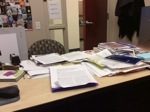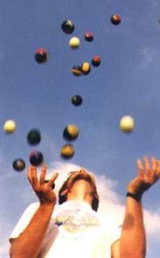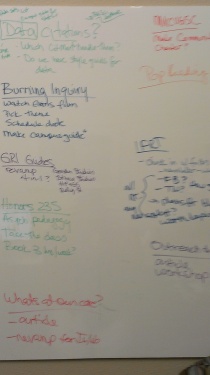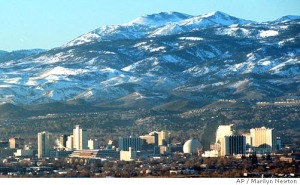This has been the season of virtual conferencing for me. I’ve given two talks via Elluminate, had training for iLinc, and am organizing my first virtual discussion. I’ve been trying to think about how best to move presentations and discussion into this new environment, and am pretty excited about the possibilities.
Before I gave my Library 2.011 talk, I attended Debbie Faires fantastic talk “Don’t Just Sit There! Tips for Engaging Participants in Online Sessions” and took advantage of her tips to make my own talk more engaging. Elluminate has some great features, and I found the shared whiteboard features very useful (you’ll see in my slides how I created blackboard moments and asked participants to share on the large white board space. I think it worked really well).
I’ve also just scheduled a virtual meeting for Midwinter for the Info Commons discussion group. We put a lot of thought into how to move our very popular physical discussion into a virtual environment. We’re limited by the capabilities of iLinc, which mostly meant we wouldn’t be able to indulge my first idea of replicating our breakout tables into virtual rooms.
The first thing we did was schedule a great speaker, and a good topic. Instead of introducing and highlighting their Commons, Don Beagle will kick us off with a presentation about his recent ECAR white paper “From Learning Commons to Learning Outcomes.” We’re also breaking away from our usual time constraints; Don will have time to give a full presentation and build upon more recent publications and also address questions that folks have asked him about his paper since it’s publication. (we have also left more time for discussion than we normally have during the tightly scheduled conference).
I’ve also asked the Discussion Group members to consider putting together 2-3 slide decks about their assessment projects and findings, and get those to me ahead of time (so I can upload them). This way, we can show and share assessment instruments, graphical and statistical findings, or anything else, in ways we have never taken advantage of in our physical meetings. And since they will have to come to me ahead of time to be organized and uploaded, I’ll be able to look for common themes in the submissions and draw parallels with the lead presentation, thus allowing me to be a better facilitator.
I’m looking forward to seeing how this works; it definitely has taken more time to organize & imagine than the usual Discussion Group meeting. I have a feeling it’s going to be worth it — and that I’m going to learn a lot doing it too!
And in case you might like to attend, here’s the meeting info:
Information Commons Discussion Group Midwinter meeting (virtual)
For Midwinter this year, the InfoCommons Discussion group will be meeting virtually. We’re very excited to try this out. We’ve reserved an iLinc room via ALA, and will meet January 112012, 1-2:30 pm Central Time. The log-in instructions are below, and on the Connect space.
Our Midwinter discussion will continue the assessment conversation we had at Annual 2011. Don Beagle will kick off our meeting with a 20-minute presentation based on his EDUCAUSE report, “From Learning Commons to Learning Outcomes.” This report was posted on Sept 27 by the EDUCAUSE Center for Applied Research (ECAR), and within 6 weeks had become the #1 most-downloaded ECAR research bulletin of 2011. Don’s comments will also go beyond the ECAR report to look in more detail at 1) recent research into cultural impacts on user expectations of service delivery (especially pertinent to “Affect of Service” as measured by LibQUAL+® , and 2) recent research by Derek Rodriguez into library impacts on student outcomes in capstone courses, and how this might be adapted for Commons model assessment.
I’d like to extend this invitation to all of you: if you have information about service assessment at your Commons that you would like to share, please feel free to put together a PowerPoint slide or two and send that to Rudy Leon by January 9. Because of the nature of iLinc, I will need to upload slides ahead of time. Slides are not necessary if you want to participate, or contribute! But if you do have something visual you want to share, we have the opportunity to do so.
We’ve scheduled 70 minutes for discussion following Don’s presentation. I’m very excited about this, and hope you are as well.
Meeting Details:
Add this meeting to your calendar: https://ala.ilinc.com/calendar/zwfwpkm/rzbswbf
Title: ACRL Info Lit Commons Virtual Midwinter Meeting
Date & Time: 01/11/2012 at 11:00 AM Central Time
Duration: 3 hour(s) and 30 minutes
Leader: Rudy Leon
Join this meeting:
Let us see who you are! Upload your picture: https://ala.ilinc.com/picture/rzbswbfnpxpymcv
Want to prepare your system ahead of time? https://ala.ilinc.com/systest/zwfwpkm
iLinc System Requirements: http://www.ilinc.com/services/support/requirements
Participant Quick Reference Card for joining and attending an iLinc session: http://www.ilinc.com/pdf/documentation/Participant-Reference-QuickStart.pdf
Need assistance? Click here.
Learn More about iLinc Web Conferencing at www.ilinc.com


 kicked into high gear (there’s a data survey that needs to be finalized and IRB’ed, and an article about outreach that needs to get out of my head and onto paper, and submitted somewhere before Dec. 31). In addition, I go to
kicked into high gear (there’s a data survey that needs to be finalized and IRB’ed, and an article about outreach that needs to get out of my head and onto paper, and submitted somewhere before Dec. 31). In addition, I go to 



